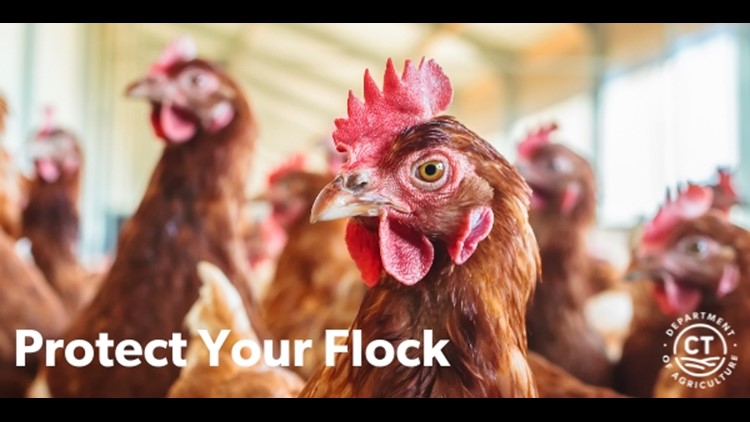HARTFORD, Conn. — The appearance of a strain of avian flu has brought a warning to local poultry owners from the Connecticut Department of Agriculture on Sunday.
The DOAG warned poultry farmers large and small of the appearance of avian flu at a backyard, non-commercial poultry flock in Suffolk County, New York. The virus has been detected throughout the Atlantic Flyway which has affected commercial and backyard flocks in Nova Scotia, Indiana, Kentucky, and Virginia.
Officials said the Avian influenza does not present an immediate public health concern. No human cases of these avian influenza viruses have been detected in the United States.
Officials said in an email, "Anyone involved with poultry production from the small backyard to the large commercial producer should review their biosecurity activities to assure the health of their birds. APHIS has materials about biosecurity, including videos, checklists, and a toolkit available at https://www.aphis.usda.gov/aphis/ourfocus/animalhealth/animal-disease-information/avian/defend-the-flock-program/dtf-resources/dtf-resources"
The agency advised poultry producers to:
- Protect flocks from coming into contact with wild or migratory birds, bring your birds inside
- Restricting access to your property and your flock
- Clean and disinfect your clothes, shoes, equipment, and hands
- Don't haul disease home if you have been near other birds or bird owners
- Don't risk disease from your neighbor (do not borrow equipment and poultry supplies from other bird owners)
- Know the warning signs
- Report sick birds
Officials said they expect with the warmer weather in late spring, the risk should subside, but for now poultry should not be allowed outside to eliminate contact with wild birds, and especially wild waterfowl.
They said symptoms of avian influenza include sudden increase in bird deaths, sneezing, coughing, nasal discharge, watery or green diarrhea, lack of energy, poor appetite, drop in egg production, swelling around the eyes, neck, and head, and purple discoloration of wattles, combs, and legs. To report sick birds, unexplained high number of deaths, or sudden drop in egg production, contact the State Veterinarian at 860-713-2505 or ctstate.vet@ct.gov or the USDA at 866-536-7593.
Officials reminded people that the proper handling and cooking of poultry and eggs to an internal temperature of 165˚F kills bacteria and viruses.
Doug Stewart is a digital content producer at FOX61 News. He can be reached at dstewart@fox61.com.
Have a story idea or something on your mind you want to share? We want to hear from you! Email us at newsteam@fox61.com
HERE ARE MORE WAYS TO GET FOX61 NEWS
Download the FOX61 News APP
iTunes: Click here to download
Google Play: Click here to download
Stream Live on ROKU: Add the channel from the ROKU store or by searching FOX61.
Steam Live on FIRE TV: Search ‘FOX61’ and click ‘Get’ to download.



